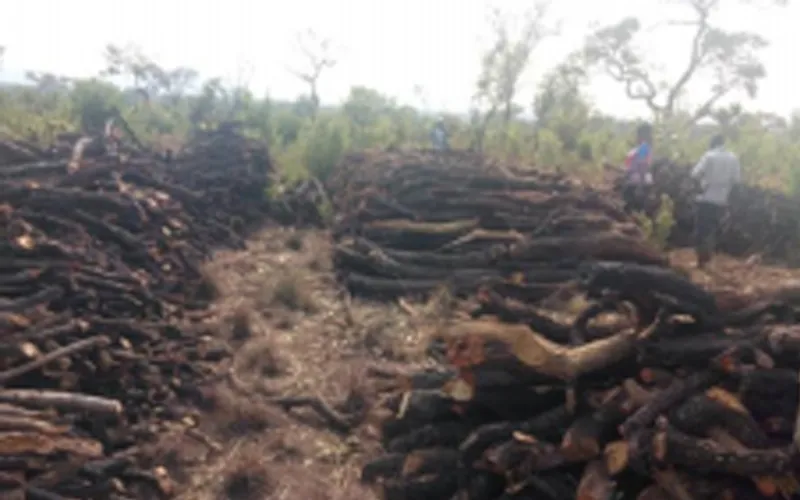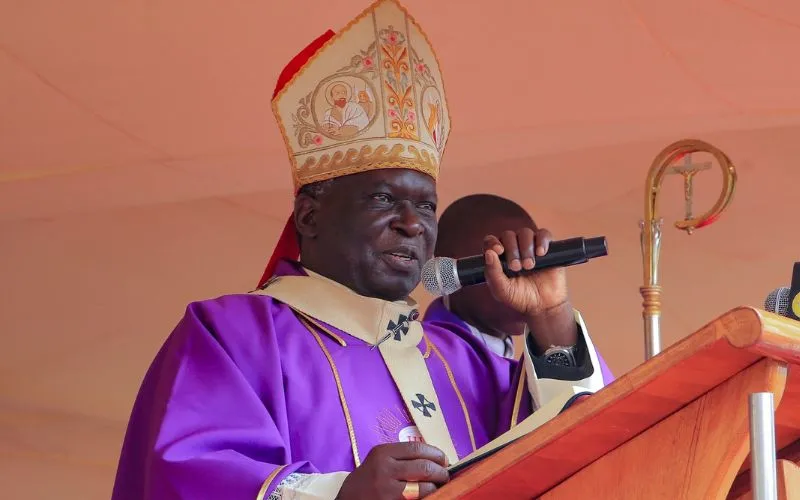A variety of vices are committed in the camps including child labor where children are forced to work in the production of charcoal to make ends meet.

According to the peace organization, which is monitoring cases of violations in other African countries as well, political elites and the government who are facilitating land grabbing in Uganda want everyone to believe it is development.
The DHPI official on the ground reports, “Lack of international awareness about the land evictions and environmental destruction during the COVID-19 lockdown exacerbates the problem.”
“The wealthy elites violate the rights of the poor by taking their land. The government does nothing about it. It in fact promotes such activities because they have an interest,” the official says, and adds, “The land and environmental degradation situation in Uganda has been kept under the radar.”
(Story continues below)
She says that in many places in northern Uganda, large billboards have been erected to warn occupants that the land will soon be taken up and developed.
The DHPI findings are in line with the vices that Church leaders in Uganda condemned during Holy Week this year.
While leading Christians to commemorate the crucifixion of Jesus on the Way of the Cross on Good Friday, the leaders including the late Archbishop of Kampala Archdiocese, Archbishop Cyprian Kizito Lwanga, the Church of Uganda Archbishop Stephen Kaziimba Mugalu, and the Bishop of Namirembe Diocese Wilberforce Kityo Luwalira jointly condemned what they termed as a rise in abuse of human rights especially the murder of Ugandans across the country.
“Those who are killing others…it is not really going to benefit them because after killing someone, you also eventually die. Land grabbing…you can grab it, even church land but one day you will die and only be provided a small piece for burial purposes,” Archbishop Kaziimba said in a report by The Independent during the ecumenical Way of the Cross that was spearheaded by the Uganda Joint Christian Council (UJCC).
The Church leaders expressed their concerns a few hours before Archbishop Lwanga succumbed to a heart attack on April 3.
In his remarks on behalf of UJCC, the late Archbishop Lwanga said that as shepherds of the country, they were concerned about the actions of some security personnel in relation to the disappearance of people, especially the youth.
The Catholic Archbishop was quoted by the Ugandan publication as saying, “This is brewing anger, division, fear and anxiety within the population and totally contravenes the human rights frameworks to which we are signatory as a country. We are troubled that the disregard of these God given rights and freedoms shall weaken our social fiber of harmony, social cohesion and responsive leadership.”
The Archbishop Kizito Lwanga appealed to Ugandans to respect life and all other human rights, saying, “Shun violence, hatred and all other forms of immorality; we also call to lead by good example and sow seeds of justice and peace and awaken society whenever it deviates from these ideals.”
In an April 20 report shared with ACI Africa, the leadership of DHPI revealed chilling human rights violations in Uganda where civilians underwent torture, sexual violence, unfair arrests, and deaths in police custody among other serious human rights violations.
In the investigation that was conducted by the Justice and Peace Commissions (JPC) of the Catholic Archdiocese of Gulu and Lira Diocese in the East African country, DHPI, which commissioned the investigation, called for action against the perpetrators of the crimes that were linked to those in authority.
Agnes Aineah is a Kenyan journalist with a background in digital and newspaper reporting. She holds a Master of Arts in Digital Journalism from the Aga Khan University, Graduate School of Media and Communications and a Bachelor's Degree in Linguistics, Media and Communications from Kenya's Moi University. Agnes currently serves as a journalist for ACI Africa.









